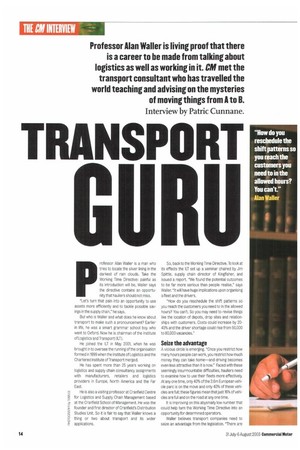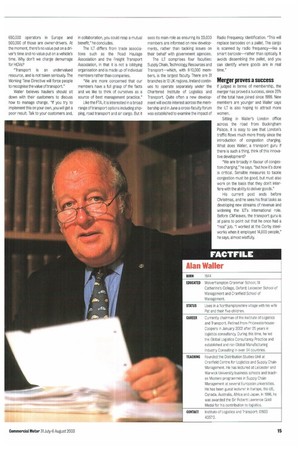TRANSPORT GURU
Page 14

Page 15

If you've noticed an error in this article please click here to report it so we can fix it.
professor Alan Waller is a man who tries to locate the silver lining in the darkest of rain clouds. Take the Working Time Directive: painful as its introduction will be, Wailer says the directive contains an opportunity that hauliers should not miss. "Let's turn that pain into an opportunity to use assets more efficiently and to tackle possible savings in the supply chain," he says.
But who is Waller and what does he know about transport to make such a pronouncement? Earlier in life, he was a smart grammar school boy who went to Oxford. Now he is chairman of the Institute of Logistics and Transport (ILT).
He joined the lLT in May 2001, when he was brought in to oversee the running of the organisation formed in 1999 when the Institute of Logistics and the Chartered Institute of Transport merged.
He has spent more than 25 years working on logistics and supply chain consultancy assignments with manufacturers, retailer's and logistics providers in Europe, North America and the Far East.
He is also a visiting professor at Cranfield Centre for Logistics and Supply Chain Management based at the Cranfield School of Management. He was the founder and first director of Cranfield's Distribution Studies Unit. So :t is fair to say that Waller knows a thing or two about transport and its wider applications. So, back to the Working Time Directive. To look at its effects the ILT set up a seminar chaired by Jim Spittle, supply chain director of Kingfisher, and issued a report. 'We found the potential outcomes to be far more serious than people realise," says Waller. "It will have huge implications upon organising a fleet and the drivers.
"How do you reschedule the shift patterns so you reach the customers you need to in the allowed hours? You can't. So you may need to revise things hike the location of depots, drop sites and relationships with customers. Costs could increase by 2040% and the driver shortage could rise from 50,000 to 80,000 vacancies."
Seize the advantage
A vicious circle is emerging. "Once you restrict how many hours people can work, you restrict how much money they can take home—and driving becomes even less attractive than it is now." Faced with these seemingly insurmountable difficulties, hauliers need to examine how to use their fleets more effectively At any one time, only 40% of the 2.6m European vehicle pare is on the move and only 40% of these vehicles are full; these figures mean that just 16% of vehicles are full and on the road at any one time.
It is improving on this abysmally law number that could help turn the Working Time Directive into an opportunity for determined operators.
Waller believes transport companies need to seize an advantage from the legislation. "There are 650,000 operators in Europe and 500,000 of those are owner-drivers. At the moment, there's no value put on a driver's time and no value put on a vehicle's time. Why don't we charge demurrage for HGV8P "Transport is an undervalued resource, and is not taken seriously The Working Time Directive will force people to recognise the value of transport."
Waller believes hauliers should sit down with their customers to discuss how to manage change. "If you try to implement this on your own, you will get a poor result. Talk to your customers and, in collaboration, you could reap a mutual benefit," he concludes.
The ILT differs from trade associations such as the Road Haulage Association and the Freight Transport Association, in that it is not a lobbying organisation and is made up of individual members rather than companies.
"We are more concerned that our members have a full grasp of the facts and we like to think of ourselves as a source of best management practice."
Like the FTA, it is interested in a broad range of transport options including shipping, road transport and air cargo. But it sees its main role as ensuring its 23,000 members are informed on new developments, rather than tackling issues on their behalf with government agencies.
The ILT comprises four faculties: Supply Chain, Technology, Resources and Transport—which, with B-10,000 members, is the largest faculty. There are 31 branches in 13 UK regions. Ireland continues to operate separately under the Chartered Institute of Logistics and Transport. Quite often a new development will excite interest across the membership and in June a cross-faculty forum was established to examine the impact of Radio Frequency Identification. "This will replace barcodes on a pallet. The cargo is scanned by radio frequency—like a smart barcode—rather than optically It avoids dissembling the pallet, and you can identify where goods are in real time."
Merger proves a success
If judged in terms of membership, the merger has proved a success, since 25% of the total have joined since 1999. New members are younger and Waller says the ILT is also hoping to attract more women.
Sitting in Waller's London office across the road from Buckingham Palace, it is easy to see that London's traffic flows much more freely since the introduction of congestion charging. What does Waller, a transport guru if there is such a thing, think of this innovative development?
"We are broadly in favour of congestion charging," he says, tut how it's done is critical. Sensible measures to tackle congestion must be good, but must also work on the basis that they don't interfere with the ability to deliver goods."
His current post ends before Christmas, and he sees his final tasks as developing new streams of revenue and widening the ILT's international role. Before CM leaves, the transport guru is at pains to point out that he once had a "real" job. 'I worked at the Corby steelworks when it employed 14,000 people," he says, almost wistfully
































































































































































